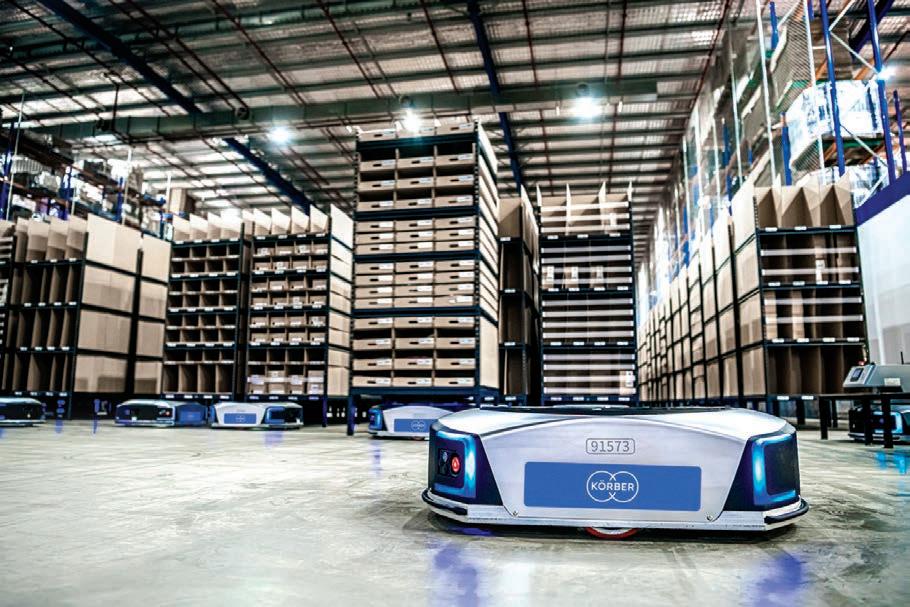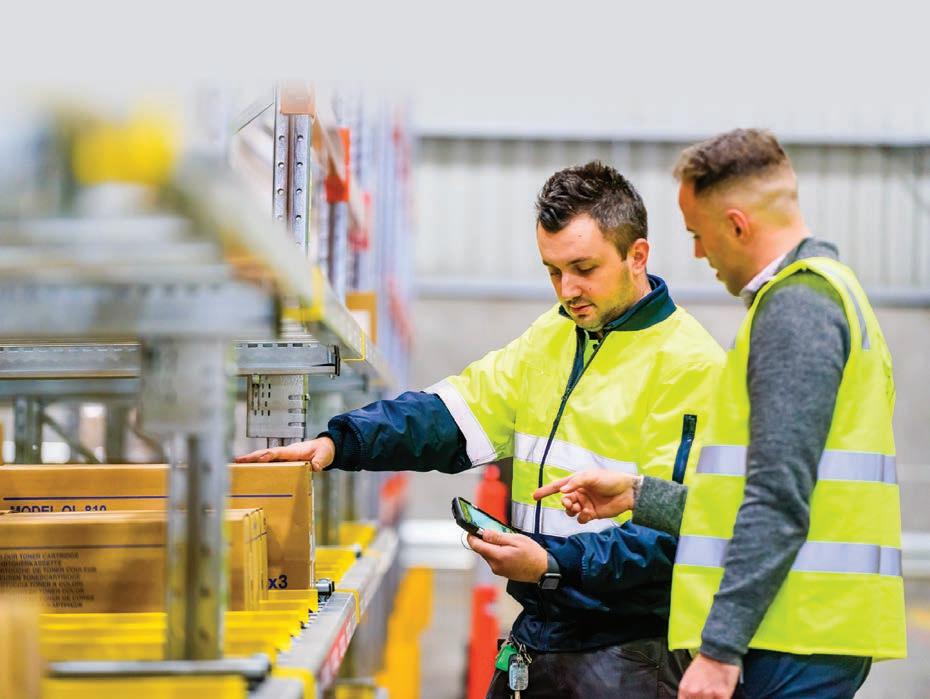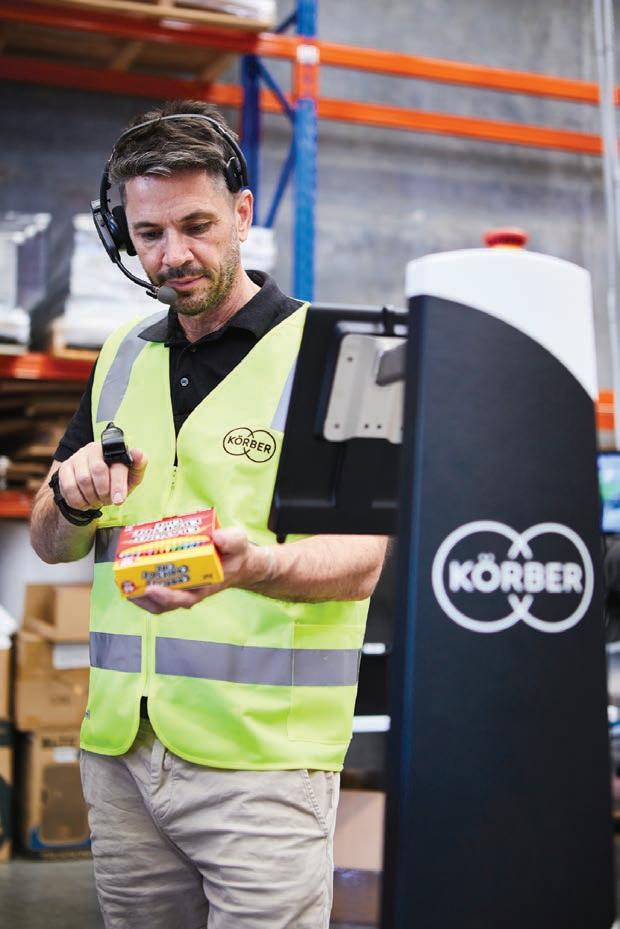
4 minute read
Körber’s global benchmarking survey
LEVERAGING THE POTENTIAL OF THE DIGITAL ERA
A global benchmarking survey by Körber Supply Chain has revealed the key challenges for supply chain operations worldwide. More than 500 respondents shared their concerns and priorities for the year ahead.
During the last decade, the supply chain has emerged as a missioncritical function that can define the success or failure of an organisation. At the same time, global megatrends such as changing consumer behaviours, the rising interconnectivity of the global economy, and unexpected disruptions like the COVID-19 pandemic have increased supply chain complexity.
Körber’s Supply Chain Benchmarking 2022 report reveals the global perspectives on supply chain complexity and performance. More than 200 organisations and 500 employees from throughout the world responded to the survey and revealed that while awareness of the external factors driving supply chain complexity was high, there is room for improvement in implementing measures to increase customer satisfaction, labour efficiency and process automation.
The report revealed that the majority of businesses are struggling with the rapid expansion of e-commerce and the increasing interconnectivity of the global economy.
With recent Australia Post data revealing e-commerce volumes are continuing to soar, with 73.1 per cent more purchases made online in 2021 than pre-pandemic in 2019 – it’s no surprise that Australian businesses are also struggling with the rapid rise.
Respondents were united in their view that digitisation is a strategic priority this year, with digitisation and process automation the highest priority for 84 per cent of all businesses.
While an overwhelming majority cited digitisation as the top priority, only a minority of businesses use automated, paperless end-to-end processes throughout their supply chain – highlighting the opportunities for major process improvements utilising stateof-the-art technology.
“It is clear that organisations are aware that digitisation and process automation will be key to success over the coming months, and we’re working with a number of household names across the APAC region to transform their operation with Körber’s portfolio of software and automation solutions,” Anthony Beavis, Managing Director ANZ at Körber Supply Chain says.
Some of Körber Supply Chain APAC’s client portfolio include Catch.com.au, Kmart, Super Retail Group, Officeworks and Chemist Warehouse.
“Many of Australia’s largest retailer providers recognise that they need to act now, and have embarked on their digitisation journey with us,” Anthony says.
From agile warehouse automation,
Körber’s Supply Chain Benchmarking 2022 report reveals the global perspectives on supply chain complexity and performance.
to WMS implementations, to microfulfilment capabilities – Körber has been helping to transform the supply chain and retail landscape in Australia with the latest technology and operational improvements.
In early 2022, after a threeyear tender process, Super Retail Group, one of Australia’s largest retailers, selected Körber Supply Chain’s K. Motion Warehouse Advantage Warehouse Management System as the future foundation of its omni-channel operations.
One of the key differentiators for Super Retail Group was the opportunity to explore not only Körber’s WMS capabilities, but Körber’s larger portfolio of services and improvements as the leading retailer continues to grow at record pace.
“We’re really excited to explore our partnership further with Körber,


particularly with some of the automation tech in their portfolio. We have a lot of areas in the business where automation could be a good fit and this first step with the new WMS will put us in a great position to strengthen our partnership further across different products and workstreams,” Patrick Fountain, General Manager Supply Chain Strategy at Super Retail Group says.
SUSTAINABILITY IS A KEY PRIORITY
Körber’s Supply Chain Benchmarking Report 2022 was divided into six operational areas: Labour engagement, efficiency and safety, end customer experience, sustainability, agility and resilience, digitisation and process automation and facility optimisation. Based on this, participating companies were grouped into the following maturity levels: leader, advanced, developing and initiating. Of this, 35 per cent were identified as “leaders” (top performers), differentiated with future-proof processes.
Sustainability was also a key theme of the report, with 89 per cent of businesses citing it as a top priority and leading companies revealing they are three times more likely to shift to more sustainable packaging materials and four times more likely than advanced companies to implement circular economy projects.
From agile warehouse automation, to WMS implementations, to micro-fulfilment capabilities – Körber has been helping to transform supply chains.
Digitisation and process automation was recognised as the highest priority for 84 per cent of all businessees taking part in the benchmarking survey.
GAINING A COMPETITIVE ADVANTAGE
Körber’s Supply Chain Benchmarking 2022 report demonstrates that companies recognise increasing supply chain complexities and are starting to act to leverage the potential of the new digital era.
“The global research demonstrates that companies recognise increasing supply chain complexities and are acting to leverage the potential of the digital era. There is a growing awareness that many challenges can be overcome, and competitive advantage gained, with supply chain technology. We look forward to working with Australia’s largest retailers and logistics providers to help them gain a competitive advantage with the latest technology and software,” Anthony Beavis, Managing Director ANZ at Körber Supply Chain says. ■











